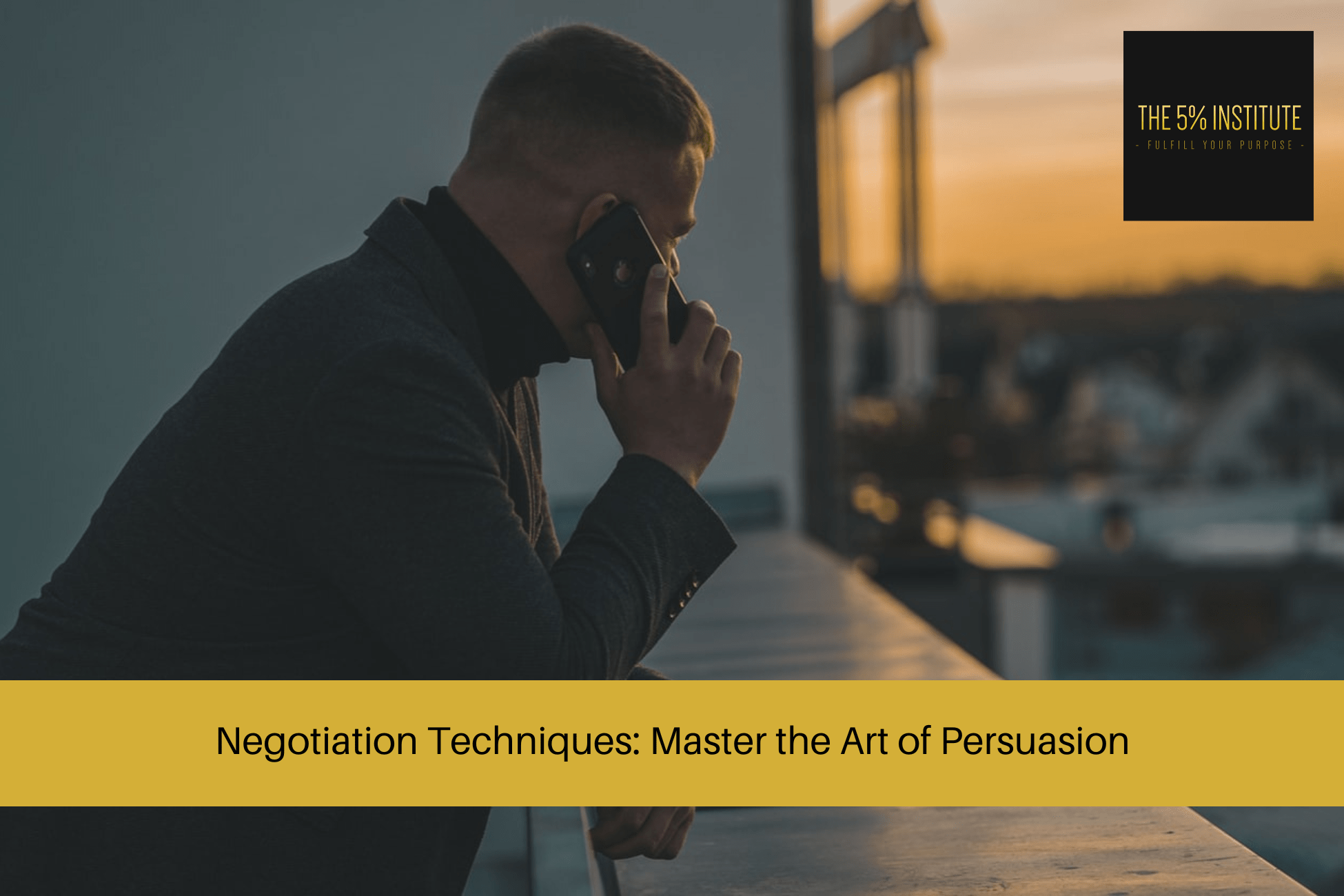
Negotiation Techniques: Master the Art of Persuasion
Negotiation is an essential skill in both personal and professional settings. Whether you’re haggling over prices at a flea market or trying to secure a business deal, effective negotiation techniques can make a significant difference in achieving your desired outcomes.
This article will explore the various strategies and approaches that can help you become a proficient negotiator.
By mastering these techniques, you’ll be equipped to navigate through complex situations, resolve conflicts, and create win-win solutions.
Understanding Negotiation Techniques
The Importance of Negotiation
Negotiation plays a pivotal role in our daily lives.
It enables us to influence others, resolve disputes, and find mutually beneficial agreements.
Whether you’re negotiating a salary, purchasing a house, or resolving conflicts within a team, honing your negotiation skills empowers you to achieve favorable outcomes.
Key Elements of Successful Negotiations
Successful negotiations are built on several key elements:
- Preparation: Adequate preparation is crucial to understand the situation, identify your objectives, and gather relevant information.
- Building Rapport and Trust: Building a positive rapport with the other party and fostering trust creates a conducive environment for open communication and collaboration.
- Creating Win-Win Solutions: The goal of negotiation should be to create mutually beneficial solutions where both parties feel satisfied with the outcome.
- Overcoming Obstacles: Negotiations often involve obstacles such as resistance or conflict. Developing strategies to overcome these hurdles is essential for a successful negotiation.
- Closing the Deal: The final stage of negotiation involves reaching an agreement and formalizing the terms and conditions.
Preparation Phase
Setting Clear Objectives
Before entering a negotiation, it’s crucial to establish clear objectives.
Define what you hope to achieve, both in terms of tangible outcomes and intangible factors such as building relationships or maintaining a positive reputation.
Clear objectives serve as guiding principles throughout the negotiation process.
Gathering Information
Information is power in negotiations.
Conduct thorough research to gather relevant data and facts about the topic at hand.
Understand the interests, needs, and concerns of all parties involved.
This knowledge will help you make informed decisions and present persuasive arguments.
Identifying Interests and Priorities
Understanding the underlying interests and priorities of each party allows you to identify potential areas of agreement and compromise.
Look beyond the surface-level demands and explore the motivations and underlying needs of the other party.
By identifying shared interests, you can work towards finding creative solutions that address everyone’s priorities.
Building Rapport and Trust
Active Listening and Empathy
Building rapport and trust is essential for effective negotiations.
One way to establish a connection is through active listening.
Pay close attention to the other party’s words, tone, and body language.
Show genuine interest in their perspective and validate their feelings and concerns.
Empathy allows you to understand their point of view and build a foundation of trust.
Effective Communication Skills
Clear and effective communication is a cornerstone of successful negotiations.
Express your ideas and concerns in a concise and articulate manner.
Use language that is respectful and non-confrontational.
Be mindful of your tone and body language, as they can significantly impact the negotiation dynamics.
By fostering open and honest communication, you can foster understanding and collaboration.
Creating Win-Win Solutions
Exploring Options and Alternatives
Negotiations should aim for win-win outcomes where both parties feel satisfied.
Instead of focusing on a single solution, explore various options and alternatives.
Brainstorm creative ideas that address the interests and needs of all parties involved.
By expanding the range of possibilities, you increase the chances of finding a mutually beneficial agreement.
Collaborative Problem-Solving
Collaboration is key to finding win-win solutions.
Encourage a cooperative atmosphere where all parties contribute their perspectives and ideas.
Foster a problem-solving mindset rather than adopting an adversarial approach.
By working together, you can leverage the strengths and expertise of each party to find innovative solutions.
Overcoming Obstacles and Handling Difficult Situations
Dealing with Resistance
Negotiations often encounter resistance from one or both parties.
Instead of viewing resistance as a roadblock, see it as an opportunity for dialogue and understanding.
Explore the reasons behind the resistance and address them constructively.
Find common ground and focus on shared goals to move the negotiation forward.
Managing Conflict
Conflict can arise during negotiations due to differing opinions and interests; which is why a part of your negotiation techniques should be learning how to handle this and bring down their emotive level.
Effective conflict management is crucial for maintaining a positive negotiation environment.
Encourage open discussions, actively listen to all perspectives, and seek common ground.
Use techniques such as mediation and compromise to find resolutions that satisfy both parties.
Closing the Deal
Persuasion and Influence
In the final stages of negotiation, persuasion and influence come into play.
Present your arguments and proposals in a compelling manner, emphasizing the benefits and value they provide.
Use evidence and logical reasoning to support your position; although emotion is also key, logic is a must needed ingredient in your negotiation techniques.
Build upon the rapport and trust you’ve established to persuade the other party to agree to the terms.
Finalizing Agreements
Once both parties reach a mutually acceptable agreement, it’s essential to formalize the terms and conditions.
Put the agreement in writing and ensure that all parties understand and are satisfied with the final outcome.
Clearly define the responsibilities, timelines, and any necessary follow-up actions.
This step helps prevent misunderstandings and provides a reference point for future discussions.
Concluding these Negotiation Techniques
Mastering negotiation techniques is a valuable skill that can benefit various aspects of your life.
By understanding the importance of negotiation, preparing thoroughly, building rapport and trust, creating win-win solutions, overcoming obstacles, and closing deals effectively, you can achieve favourable outcomes in your negotiations.
Remember to approach negotiations with an open mind, actively listen to the other party, and maintain a focus on collaboration and mutual understanding.
FAQs (Frequently Asked Questions)
Q: How long does it take to become a skilled negotiator?
A: Becoming a skilled negotiator is a continuous learning process.
It depends on your dedication, practice, and experience.
While some negotiation techniques can be learned quickly, mastering the art of negotiation takes time and ongoing refinement of your skills.
Q: What should I do if negotiations reach a deadlock?
A: If negotiations reach a deadlock, it’s important to remain calm and explore alternative options.
Consider involving a neutral third party, such as a mediator, to help facilitate the discussion and find common ground.
It may also be helpful to take a break and revisit the negotiation with a fresh perspective.
Q: How can I handle aggressive or difficult negotiators?
A: Dealing with aggressive or difficult negotiators requires tact and patience.
Stay focused on the issues at hand and avoid getting caught up in personal attacks.
Maintain a calm and professional demeanor, and try to understand their underlying concerns.
Use active listening and empathy to diffuse tension and find areas of agreement.
Q: Is it possible to negotiate effectively without compromising relationships?
A: Yes, it is possible to negotiate effectively without compromising relationships.
By adopting a collaborative approach and focusing on win-win solutions, you can maintain positive relationships while still achieving your objectives.
Open and transparent communication, respect for the other party’s needs, and a willingness to find mutually beneficial outcomes are key.
Q: Are negotiation techniques applicable in personal relationships?
A: Absolutely. Negotiation techniques are applicable in various aspects of personal relationships, such as resolving conflicts, making joint decisions, or managing family dynamics.
Effective communication, active listening, and finding compromises are essential skills that can strengthen personal relationships.
Remember, negotiation is an art that requires practice, adaptability, and a willingness to learn from each experience.
By honing your negotiation techniques, you can navigate through challenging situations with confidence and achieve successful outcomes.
So embrace the power of negotiation and apply these strategies to enhance your ability to influence and collaborate effectively.
Want To Close Sales Easier?
Are you committed to closing sales a lot easier, and consistently?
If so, you should check out our self-paced and affordable online sales training program; The 5% Sales Blueprint.
It’ll give you everything you need to close sales consistently.
To learn more, simply click on the link below for more information.
Our Online Sales Training Program – The 5% Sales Blueprint.



